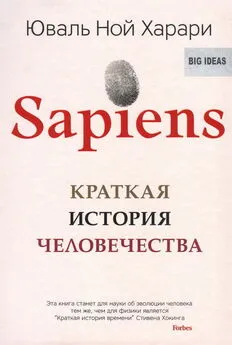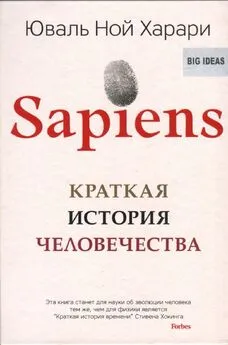Юваль Ной Харари - Homo Deus. Краткая история будущего
- Название:Homo Deus. Краткая история будущего
- Автор:
- Жанр:
- Издательство:Синдбад
- Год:2018
- Город:Москва
- ISBN:978-5-906837-92-9
- Рейтинг:
- Избранное:Добавить в избранное
-
Отзывы:
-
Ваша оценка:
Юваль Ной Харари - Homo Deus. Краткая история будущего краткое содержание
Что произойдет, когда Google и Facebook будут лучше, чем мы сами, знать наши вкусы, личные симпатии и политические предпочтения? Что будут делать миллиарды людей, вытесненных компьютерами с рынка труда и образовавших новый, бесполезный класс? Как воспримут религии генную инженерию? Каковы будут последствия перехода полномочий и компетенций от живых людей к сетевым алгоритмам? Что должен предпринять человек, чтобы защитить планету от своей же разрушительной силы?..
Главное сейчас, полагает Харари, – осознать, что мы находимся на перепутье, и понять, куда ведут пути, простирающиеся перед нами. Мы не в силах остановить ход истории, но можем выбрать направление движения.
Homo Deus. Краткая история будущего - читать онлайн бесплатно ознакомительный отрывок
Интервал:
Закладка:
188
Donna Haraway, ‘A Cyborg Manifesto: Science, Technology, and Socialist-Feminism in the Late Twentieth Century’, in Simians, Cyborgs and Women: Te Reinvention of Nature , ed. Donna Haraway (New York: Routledge, 1991), 149–181.
189
Подробнее см.: Michael S. Gazzaniga, Who's in Charge?: Free Will and the Science of the Brain (New York: Ecco, 2011).
190
Паддингтон – крупный железнодорожный узел в Лондоне.
191
Chun Siong Soon et al., ‘Unconscious Determinants of Free Decisions in the Human Brain’, Nature Neuroscience 11:5 (2008), 543–545. См. также: Daniel Wegner, Te Illusion of Conscious Will (Cambridge, MA: MIT Press, 2002); Benjamin Libet, ‘Unconscious Cerebral Initiative and the Role of Conscious Will in Voluntary Action’, Behavioral and Brain Sciences 8 (1985), 529–566.
192
Sanjiv K. Talwar et al., ‘Rat Navigation Guided by Remote Control’, Nature 417:6884 (2002), 37–38; Ben Harder, ‘Scientists “Drive” Rats by Remote Control’, National Geographic , 1 May 2012, accessed 22 December 2014, http://news.nationalgeographic.com/news/2002/05/0501_020501_roborats.html; Tom Clarke, ‘Here Come the Ratbots: Desire Drives Remote-Controlled Rodents’, Nature , 2 May 2002, accessed 22 December 2014, http://www.nature.com/news/1998/020429/full/news020429–9.html; Duncan Graham-Rowe, ‘“Robo-rat” Controlled by Brain Electrodes’, New Scientist , 1 May 2002, accessed 22 December 2014, http://www.newscientist.com/article/dn2237–roborat-controlled-by-brain-electrodes.html#.UwOPiNrNtkQ.
193
http://fusion.net/story/204316/darpa-is-implanting-chips-in-soldiers-brains/; http://www.theverge.com/2014/5/28/5758018/darpa-teams-begin-work-on-tiny-brain-implant-to-treat-ptsd.
194
Smadar Reisfeld, ‘Outside of the Cuckoo’s Nest’, Haaretz , 6 March 2015.
195
Dan Hurley, ‘US Military Leads Quest for Futuristic Ways to Boost IQ’, Newsweek , 5 March 2014, http://www.newsweek.com/2014/03/14/us-military-leads-quest-futuristic-ways-boost-iq-247945.html, accessed 9 January 2015; Human Effectiveness Directorate, http://www.wpafb.af.mil/afrl/rh/index.asp; R. Andy McKinley et al., ‘Acceleration of Image Analyst Training with Transcranial Direct Current Stimulation’, Behavioral Neuroscience 127:6 (2013): 936–946; Jeremy T. Nelson et al., ‘Enhancing Vigilance in Operators with Prefrontal Cortex Transcranial Direct Current Stimulation (TDCS)’, NeuroImage 85 (2014): 909–917; Melissa Scheldrup et al., ‘Transcranial Direct Current Stimulation Facilities Cognitive Multi-Task Performance Diferentially Depending on Anode Location and Subtask’, Frontiers in Human Neuroscience 8 (2014); Oliver Burkeman, ‘Can I Increase my Brain Power?’, Guardian , 4 January 2014, http://www.theguardian.com/science/2014/jan/04/can-i-increase-my-brain-power, accessed 9 January 2016; Heather Kelly, ‘Wearable Tech to Hack Your Brain’, CNN, 23 October 2014, http://www.cnn.com/2014/10/22/tech/innovation/brain-stimulation-tech/. accessed 9 January 2016.
196
Sally Adee, ‘Zap Your Brain into the Zone: Fast Track to Pure Focus’, New Scientist , 6 February 2012, accessed 22 December 2014, http://www.newscientist.com/article/mg21328501.600–zap-your-brain-into-the-zone-fast-track-to-pure-focus.html. See also: R. Douglas Fields, ‘Amping Up Brain Function: Transcranial Stimulation Shows Promise in Speeding Up Learning’, Scientifc American , 25 November 2011, accessed 22 December 2014, http://www.scientifcamerican.com/article/amping-up-brain-function.
197
Sally Adee, ‘How Electrical Brain Stimulation Can Change the Way We Think’, The Week , 30 March 2012, accessed 22 December 2014, http://theweek.com/article/index/226196/how-electrical-brain-stimulation-can-change-the-way-we-think/2.
198
E. Bianconi et al., ‘A n Estimation of the Number of Cells in the Human B o d y,’ Annals of Human Biology 40:6 (2013): 463–471.
199
Oliver Sacks, The Man Who Mistook His Wife for a Hat (London: Picador, 1985), 73–75.
200
Joseph E. LeDoux, Donald H. Wilson, Michael S. Gazzaniga, ‘A Divided Mind: Observations on the Conscious Properties of the Separated Hemispheres’, Annals of Neurology 2:5 (1977), 417–421. См. также: D. Galin, ‘Implications for Psychiatry of Left and Right Cerebral Specialization: A Neurophysiological Context for Unconscious Processes’, Archives of General Psychiatry , 31:4 (1974), 572–583; R. W. Sperry, M. S. Gazzaniga and J. E. Bogen, ‘Interhemispheric relationships: Te Neocortical Commisures: Syndromes of Hemisphere Disconnection’, in Handbook of Clinical Neurology , ed. P. J. Vinken and G. W. Bruyn (Amsterdam: North Holland Publishing Co., 1969), vol. 4.
201
Michael S. Gazzaniga, The Bisected Brain (New York: Appleton-Century-Crofs, 1970); Gazzaniga, Who’s in Charge? ; Carl Senior, Tamara Russell, and Michael S. Gazzaniga, Methods in Mind (Cambridge, MA: MIT Press, 2006); David Wolman, ‘Te Split Brain: A Tale of Two Halves’, Nature 483 (14 March 2012): 260–263.
202
Galin, ‘Implications for Psychiatry of Left and Right Cerebral Specialization’, 573–574.
203
Springer and Deutsch, Lef Brain, Right Brain , 3rd edn (New York: W. H. Freeman, 1989), 32–36.
204
Kahneman, Tinking, Fast and Slow , 377–410. See also Gazzaniga, Who’s in Charge? , ch. 3.
205
Eran Chajut et al., ‘In Pain Tou Shalt Bring Forth Children: Te Peak-and-End Rule in Recall of Labor Pain’, Psychological Science 25:12 (2014), 2266–2271.
206
Ulla Waldenström, ‘Women’s Memory of Childbirth at Two Months and One Year afer the Birth’, Birth 30:4 (2003), 248–254; Ulla Waldenström, ‘Why Do Some Women Change Teir Opinion about Childbirth over Time?’, Birth 31:2 (2004), 102–107.
207
Gazzaniga, Who's in Charge? , ch. 3.
208
Jorge Luis Borges, Collected Fictions , translated by Andrew Hurley (New York: Penguin Books, 1999), 308–309. Издание на испанском языке см.: Jorge Luis Borges, ‘Un problema’, in Obras completas , vol. 3 (Buenos Aires: Emece Editores, 1968–1969), 29–30.
209
Mark Tompson, Te White War: Life and Death on the Italian Front, 1915–1919 (New York: Basic Books, 2009).
210
Всеобщая мобилизация ( фр .).
211
F. M. Anderson, ed., Te Constitutions and Other Select Documents Illustrative of the History of France: 1789–1907 , 2nd edn (Minneapolis: H. W. Wilson, 1908), 184–185; Alan Forrest, ‘L’armée de l’an II: la levée en masse et la création d’un mythe républicain’, Annales historiques de la Révolution francais 335 (2004), 111–130.
212
Morris Edmund Spears, ed., World War Issues and Ideals: Readings in Contemporary History and Literature (Boston and New York: Ginn and Company, 1918), 242. Наиболее репрезентативным и широко цитируемым современным исследованием, ставящим целью доказать, что армии демократических государств сражаются успешнее, считается: Dan Reiter and Allan C. Stam, Democracies at War (Princeton: Princeton University Press, 2002).
213
Doris Stevens, Jailed for Freedom (New York: Boni and Liveright, 1920), 290. См. также: Susan R. Grayzel, Women and the First World War (Harlow: Longman, 2002), 101–106; Christine Bolt, Te Women’s Movements in the United States and Britain from the 1790s to the 1920s (Amherst: University of Massachusetts Press, 1993), 236–276; Birgitta Bader-Zaar, ‘Women’s Sufrage and War: World War I and Political Reform in a Comparative Perspective’, in Sufrage, Gender and Citizenship: International Perspectives on Parliamentary Reforms , ed. Irma Sulkunen, Seija-Leena Nevala-Nurmi and Pirjo Markkola (Newcastle upon Tyne: Cambridge Scholars Publishing, 2009), 193–218.
214
Matt Richtel and Conor Dougherty, ‘Google’s Driverless Cars Run Into Problem: Cars With Drivers’, New York Times , 1 September 2015, accessed 2 September 2015, http://www.nytimes.com/2015/09/02/technology/personaltech/google-says-its-not-the-driverless-cars-fault-its-other-drivers. html?_r=1; Shawn DuBravac, Digital Destiny: How the New Age of Data Will Transform the Way We Work, Live and Communicate (Washington DC: Regnery Publishing, 2015), 127–156.
215
Bradley Hope, ‘Lawsuit Against Exchanges Over “Unfair Advantage” for High-Frequency Traders Dismissed’, Wall Street Journal, 29 April 2015, accessed 6 October 2015, http://www.wsj.com/articles/lawsuit-against-exchanges-over-unfair-advantage-for-high-frequency-traders-dismissed-1430326045; David Levine, ‘High-Frequency Trading Machines Favored Over Humans by CME Group, Lawsuit Claims’, Hufngton Post , 26 June 2012, accessed 6 October 2015, http://www.hufngtonpost.com/2012/06/26/high-frequency-trading-lawsuit_n_1625648.html; Lu Wang, Whitney Kisling and Eric Lam, ‘Fake Post Erasing $136 Billion Shows Markets Need Humans’, Bloomberg , 23 April 2013, accessed 22 December 2014, http://www.bloomberg.com/news/2013–04–23/fake-report-erasing-136–billion-shows-market-s-fragility.html; Matthew Philips, ‘How the Robots Lost: High-Frequency Trading’s Rise and Fall’, Bloomberg Businessweek , 6 June 2013, accessed 22 December 2014, http://www.businessweek.com/printer/articles/123468–how-the-robots-lost-high-frequency-tradings-rise-and-fall; Steiner, Automate Tis , 2–5, 11–52; Luke Dormehl, Te Formula: How Algorithms Solve All Our Problems – And Create More (London: Penguin, 2014), 223.
216
Jordan Weissmann, ‘iLawyer: What Happens when Computers Replace Attorneys?’, Atlantic , 19 June 2012, accessed 22 December 2014, http://www.theatlantic.com/business/archive/2012/06/ilawyer-what-happens-when-computers-replace-attorneys/258688; John Markof, ‘Armies of Expensive Lawyers, Replaced by Cheaper Sofware’, New York Times , 4 March 2011, accessed 22 December 2014, http://www.nytimes.com/2011/03/05/science/05legal.html?pagewanted=all&_r=0; Adi Narayan, ‘Te fMRI Brain Scan: A Better Lie Detector?’, Time , 20 July 2009, accessed 22 December 2014, http://content.time.com/time/health/article/0,8599,1911546–2,00.html; Elena Rusconi and Timothy Mitchener-Nissen, ‘Prospects of Functional Magnetic Resonance Imaging as Lie Detector’, Frontiers in Human Neuroscience 7:54 (2013); Steiner, Automate Tis,217; Dormehl, Te Formula , 229.
Читать дальшеИнтервал:
Закладка:





![Жак Аттали - Краткая история будущего [Мир в ближайшие 50 лет]](/books/1076384/zhak-attali-kratkaya-istoriya-buduchego-mir-v-blizhajsh.webp)
![Юваль Ной Харари - 21 урок для XXI века [Версия с комментированными отличиями перевода]](/books/1080711/yuval-noj-harari-21-urok-dlya-xxi-veka-versiya-s-ko.webp)

![Юваль Ной Харари - Sapiens. Краткая история человечества [litres]](/books/1102059/yuval-noj-harari-sapiens-kratkaya-istoriya-cheloveche.webp)

